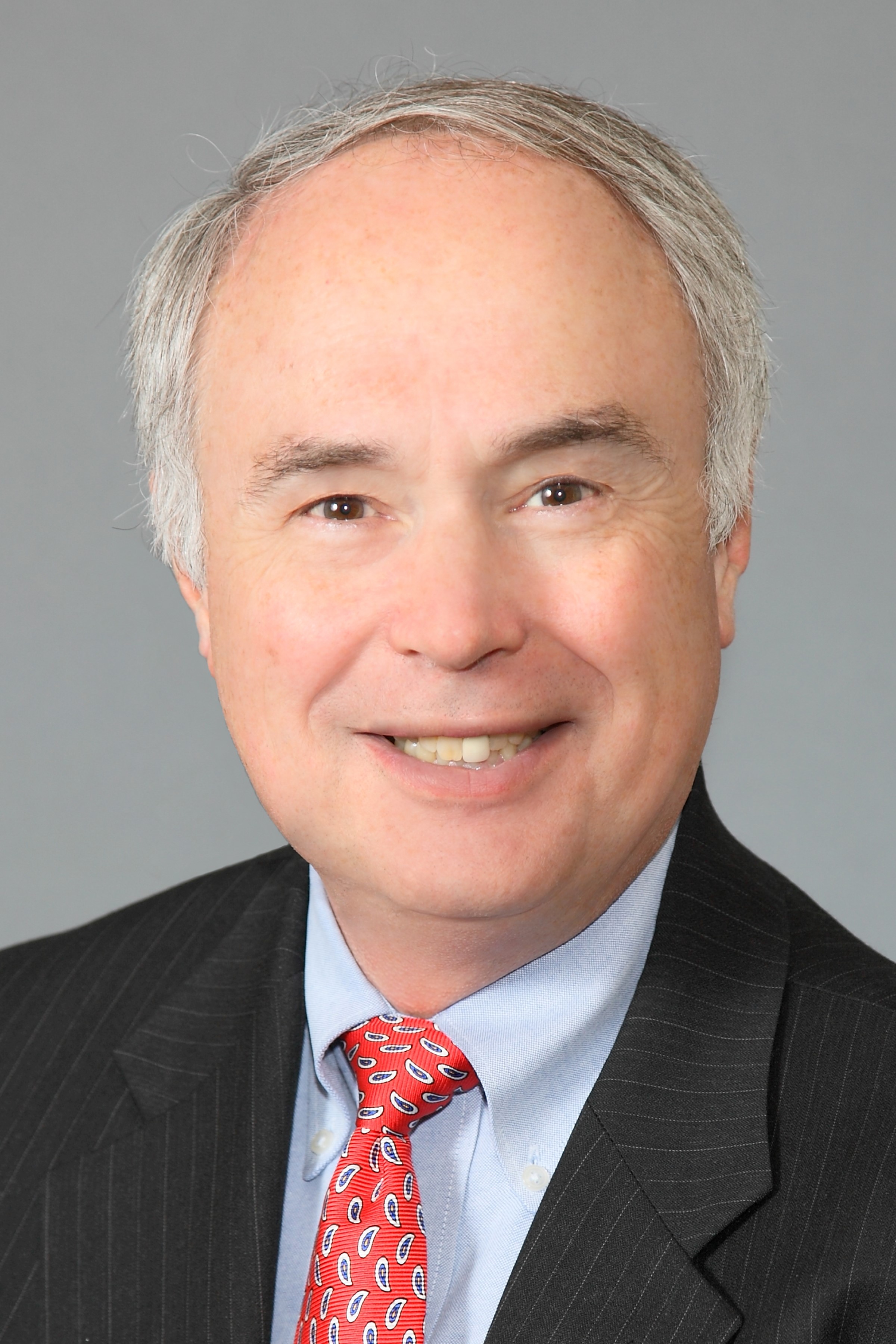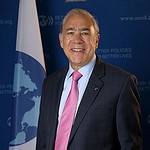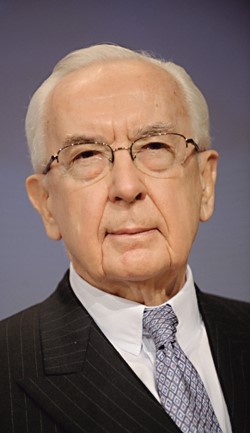Quarterly Bulletin
Winter 2015
Winter 2015 E-Bulletin: IMF Roundtable, Asia Outlook Virtual Conference, Member Views on TPA, Upcoming Programs
Roundtable: Reassessing the IMF's Role in Sovereign Debt Crises

On Friday February 6th, 2015 a group of approximately 25 Bretton Woods Committee members held a private roundtable discussion with senior International Monetary Fund (IMF) officials to reassess the IMF’s role in sovereign debt crises. The dialogue – moderated by William R. Rhodes – afforded the Fund an opportunity to gather timely input from a cross-section of the Committee’s private sector leaders, policy experts and academics as it rethinks its approach to sovereign debt restructuring with the objective of reducing the costs and risks for all stakeholders: sovereign debtors, creditors, and the overall system.
The closed-door dialogue took place at the Fund’s headquarters in Washington, DC and focused specifically on the proposals floated by IMF staff in its June 2014 report to reform the Fund’s exceptional access framework and eliminate the systemic exemption established in 2010. Leading representatives from the U.S. Department of Treasury and the Federal Reserve Bank of New York were also involved.
This was the first of what will likely be a series of consultative discussions with the Bretton Woods Committee as IMF officials deliberate proposals in the months ahead to reform their sovereign debt lending practices and framework.
For a copy of the IMF staff paper under discussion click here.
On January 27, 2015 the Bretton Woods Committee hosted its first virtual conference, Windows Into the IFIs: The Outlook for Economic Growth and Investment in Asia. The event featured remarks from Joseph E. Zveglich, Director of the Macroeconomics Research Division of the Asian Development Bank on the ADB's recently released report, Asian Development Outlook Supplement: Growth Hesitates in Developing Asia. Sir David Wright, Vice Chairman at Barclays, offered follow-up commentary and questions. The discussion was facilitated by Randy Rodgers, Executive Director of the Bretton Woods Committee.
Views From The Members: Congressional Perspectives on Trade
Bill Reinsch, President of the National Foreign Trade Council and Bretton Woods Committee member, discusses the value of Trade Promotion Authority legislation and the implications for regional and multilateral trade agreement negotiations.

America Needs Trade Promotion Authority
Every year around this time, the Washington trade policy community hypothesizes on what to expect on trade in the coming months. We set high hopes for the conclusion of agreements and passage of trade legislation that will keep our economy moving in the right direction. While no one knows for sure exactly what the future holds for trade in 2015, one thing is certain: America needs Trade Promotion Authority (TPA)
TPA is a critical tool to most effectively negotiate and enact market-opening trade and investment agreements with U.S. trading partners across the globe. With the expected conclusion of the Trans-Pacific Partnership (TPP) in the near future and other major agreements – like the Transatlantic Trade and Investment Partnership (TTIP), the Trade in Services Agreement (TISA) and an Environmental Goods Agreement – under negotiation, Congress has an incentive to pass a bipartisan TPA bill early this year. Bipartisan is a key word and reflects the support that TPA has both on the Hill and within the Administration. From President Obama to House and Senate leadership on the other side of the aisle, there is widespread support for TPA. So why not get it done as soon as possible?
Some members are skeptical and do not want to give this president, or any future president, TPA. They worry in doing so Congress would give up its role and authority on trade to the president. This could not be farther from the truth. In a letter on January 27 to all members of Congress, the NFTC set the record straight. Here are our key points:
• TPA Gives Congress Power to Set Negotiating Objectives: With TPA, Congress has the opportunity to shape the U.S. trade agenda by setting the goals and priorities U.S. negotiators should pursue in trade talks. The last TPA legislation was passed in 2002, so this point is especially important, as the world economy has changed significantly since then. This change brings new issues to consider – including global value chains and cross-border data flows – and Congress should provide feedback on such issues as we pursue 21st century trade agreements.
• TPA Strengthens U.S. Position in Negotiations: Providing congressional input to U.S. negotiators ahead of trade talks gives our negotiating counterparts more confidence that what is agreed to in negotiations will not be picked apart during the congressional approval process. This will inevitably encourage our trading partners to put forth their best at the negotiating table, helping us to achieve high-standard, comprehensive agreements.
Congress should act now to pass modernized TPA legislation, so that we can fully maximize the benefits of TPP, TTIP, TISA and other trade deals currently under negotiation – not to mention future agreements. Trade is critically important to our economy, and deals like these set the rules for a fairer trading system and level the playing field for U.S. companies to benefit our economy and the American people. With more than one in five jobs tied to trade and the majority of the world’s consumers outside of our borders, trade is critical to expanding the U.S. economy and supporting American jobs – on our farms and ranches to our assembly lines and plants.
We need TPA, and we need it sooner rather than later.
Upcoming Programs
Here is a look-ahead to our upcoming programs:
- Enhancing Eurozone Stability: Progress Toward Banking and Capital Markets Reform, April 16, 2015, 10:00am – 12:00pm, Italian Embassy, Washington D.C.
- Digital Payments/Currencies: Global Threat or Opportunity?, April 23, 2015, 9:00am – 12:00pm, George Washington University, Washington D.C.
- 2015 Annual Meeting – Bretton Woods and Global Growth: An Evolving Story, May 19, 2015, 9:00am – 2:00pm, World Bank, Washington D.C.
- Emerging Markets Virtual Conference Series
- Windows Into the IFIs: Quarterly Briefing Series
- Q2 Bulletin
- Note: The Congressional Education Seminars scheduled for March 6 had to be postponed due to inclement weather and will be rescheduled for a later date.
To see a full calendar of our 2015 programs, please click here. Also, please periodically check our website for more specific information on timing and topics as events draw near. If you have ideas for future Committee programs please do not hesitate to reach the Committee’s Deputy Director, Emily Slater, or call 202-331-1616.
Member’s Corner
Member Spotlight
The Bretton Woods Committee would like to recognize two outstanding members for their recent achievements:

Angel Gurria, Secretary-General of the OECD and Bretton Woods Committee member, received the Nueva Economía Award. This award acknowledges individuals for their work on economic development and social cohesion on behalf of Spain. The award particularly recognizes the work that the OECD has done over a period of more than 50 years to help open Spain up to the outside world and modernize its economic and social policies.
 Jacques de Larosière, former managing Director of the International Monetary Fund, Governor of the Banque de France, President of the European Bank for Reconstruction and Development, and Bretton Woods Committee member received the Lifetime Achievement award at the 2015 Central Banking Awards. A champion of international monetary stability, de Larosière was behind many economic successes during the latter part of the 20th century. He helped save the international monetary system from the collapse of Bretton Woods, and was a key driving force behind Economic and Monetary Union in Europe.
Jacques de Larosière, former managing Director of the International Monetary Fund, Governor of the Banque de France, President of the European Bank for Reconstruction and Development, and Bretton Woods Committee member received the Lifetime Achievement award at the 2015 Central Banking Awards. A champion of international monetary stability, de Larosière was behind many economic successes during the latter part of the 20th century. He helped save the international monetary system from the collapse of Bretton Woods, and was a key driving force behind Economic and Monetary Union in Europe.
Welcome New Members!
On behalf of the entire Committee, we would like to recognize and welcome our new members who have joined the Committee last quarter:
• Bozkurt Aran, Director, TEPAV Economic Research Foundation of Turkey
• Ana Maria Carrasquilla, Executive President, Fondo Latinoamericano de Reservas
• Robert L. Clarke, Senior Partner, Bracewell & Giuliani LLP
• Stephen T. Ganyard, President, Avascent International
• Kenneth W. Hansen, Partner, Chadbourne & Parke LLP
• Eric Rauchway, Professor of History, University of California, Davis
• Geoffrey Underhill, Professor of International Governance, University of Amsterdam
• Deborah Zandstra, Partner, Clifford Chance LLP
The deadline for the Henry Owen Essay Award is fast approaching. Submissions are due by March 20, 2015 at 5:00pm ET. This contest is open to all graduate-level students in the Washington, DC metro area. This year’s topic focuses on how Bretton Woods Institutions should evolve in light of new actors and financing mechanisms affecting the architecture of global development. Please share contest details via our website with graduate-level students who may be interested in the essay contest or colleagues and friends who may assist in distributing this announcement.
The Bretton Woods Committee
1726 M Street, NW, Suite 200, Washington DC 20036
P: 202-331-1616 F: 202-785-9423 www.brettonwoods.org
